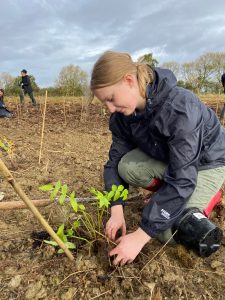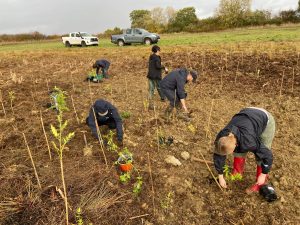From windowsills to wetlands: rare plants help to restore Oxfordshire freshwaters
27th October 2022
Freshwater Habitats Trust is moving around 500 endangered plants from homes and community centres across Oxfordshire to local freshwater habitats. With many ‘lost’ species being reintroduced, the wildlife conservation charity is bringing back wildlife to Oxfordshire’s freshwaters, fens and wetlands.
Over the summer, the Oxford-based charity invited people to volunteer for its GroWet project. Approximately 500 people signed up to nurture a rare wetland plant in their gardens and even on their windowsills. The plants were grown from seed and cuttings at Oxford Botanic Garden before being delivered to homes and community centres.
With the help of volunteers, Freshwater Habitats Trust is now planting some of the GroWet plants at Otmoor RSPB reserve, just outside Oxford. The team will then introduce plants to other ponds, streams and wetlands across the county.
They include 27 native species, which were once plentiful in the British countryside and across Oxfordshire but are now in decline. Some are so rare they are at risk of becoming extinct in England without the sort of help being offered through GroWet. Some of the rarest examples are:
- Grass-of-Parnassus: a striking white-flowered plant of fens, which is locally scarce in Oxfordshire, with only two locations recorded in the county since 2010.
- Tawny-sedge, which grows in peatlands and damp meadows and, in Oxfordshire, is now limited to ten sites.
- Tubular Water-dropwort, which is classed as Vulnerable on the UK Red Data Book list, having declined dramatically since the 1950s particularly because of wetland drainage and pollution.
These plants are a vital but threatened part of Britain’s freshwater biodiversity and they also provide habitats for other wildlife. These range from amphibians, including protected species such as the Common Toad, to insects, including dragonflies and damselflies, mammals and birds.
GroWet is part of Freshwater Habitats Trust’s Building Oxfordshire’s Freshwater Network project. Funded through the Government’s Green Recovery Challenge Fund, this major initiative marks the beginning of the charity’s new approach to protecting and restoring freshwater habitats by building a national network of high quality habitats for wildlife.
To support GroWet, Freshwater Habitats Trust ran a series of community events including a Big Nature Day at Hinksey Heights Nature Reserve in Oxford.
 Lizzie Every, Community Engagement Officer
Lizzie Every, Community Engagement Officer
Freshwater Habitats Trust Community Engagement Officer Lizzie Every said: “GroWet has had such a positive response from people across Oxfordshire and we’re so grateful to all our volunteers. We hear so much bad news about the environment that we can often feel helpless. GroWet has given people the opportunity to do something practical that could make a real difference to wildlife on their doorstep. Caring for a rare plant at home has also connected people to our beautiful but threatened wetlands.”
Freshwater Habitats Trust CEO Jeremy Biggs said: “We’re losing freshwater wildlife fast. To protect what’s left and reverse the decline, we need to focus on protecting remaining high quality freshwater and wetland habitats.
“That’s why we’re creating the Freshwater Network – a national network of clean, unpolluted habitats for nature to thrive. We’ve started here in Oxfordshire, which is one of our Important Freshwater Landscapes, with an extraordinary but declining freshwater heritage.
“Involving the local community through GroWet is a vital part of this project. By nurturing endangered plants, local people are helping us to restore some of Britain’s most precious wetlands.”
Freshwater Habitats Trust will monitor the plants over the coming months and years to assess the long-term impact of GroWet.

